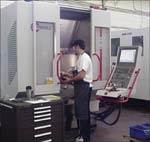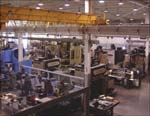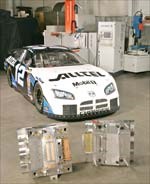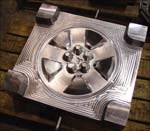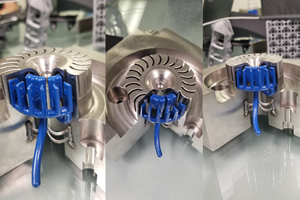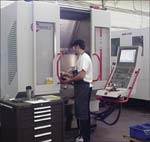Ameritech Die & Mold: Life in the Fast Lane
With a heavy emphasis on complex, 3-D parts—primarily in the automotive industry—this moldmaker comes in first place when it comes to unwavering commitment to its employees.
Steve Rotman, president of Mooresville, NC-based Ameritech Die & Mold, Inc.—a producer of medium to large injection, compression, and blow molds primarily in the automotive industry—has made mixing business with pleasure an art form. As passionate as the company is about its work for the auto racing industry, which includes small-hole EDM work as well as mold repair, it is equally excited to share in the success of the Penske and Gannasi racing teams—as the three have been located in the same industrial park.
For example, the company was thrilled to host car racer Ryan Newman's Fan Appreciation Party in its parking lot two years ago. "Our park turns into a fan club the week before the two major events at Lowe's Motor Speedway in Charlotte," Rotman comments. "We always get 40 tickets that we use for customer appreciation for the event that used to be called the Winston, now known as the Nextel All Star Race."
At the same time, Ameritech is extremely serious about its work—specializing in complex, 3-D parts, mainly for the automotive industry. "These are Class 'A' parts that cannot have flash or trimming," Rotman explains. "We have excellent design capabilities with an intensity to perform better than any mold shop. We pride ourselves on not having to hand spot the parting lines of a 3-D surfaced part—along with excellent cooling and venting to allow the processor full control of the molding process."
Off To The Races
Twenty years ago, Rotman started the company with Ronald and Richard Wozny—leasing a building approximately five miles from where the current facility stands. A year later, the trio purchased a 3.3-acre site in Lakeside Park. Right after they moved in, the building next to them was purchased, and now houses Penske Racing South, Rusty Wallace Inc., Yates Engine Company, Wood Brothers Team, and numerous Bush and Truck teams. "We fell into a goldmine without knowing it!" Rotman recalls of Ameritech's good fortune—as it marked the beginning of their entrance into the automotive/racing industry.
Ameritech has celebrated huge successes with first-time wins with Ryan Newman, Jeremy Mayfield and Kyle Petty. "We also have mourned the losses of the late Rob Moroso, Davie Allison and Dale Earnhardt by joining the local teams with their flags at half mast," Rotman notes. "I followed Dale Earnhardt since the early '80s, before he was so popular. He was definitely my favorite driver."
In 1996, Rotman expanded the facility to 55,000 square feet—occupying 26,500 square feet of the building and leasing out the other portion to an engineering firm for the nuclear power industry. Four years later, Rotman had the opportunity to buy out his original partners. "At that time, the China explosion was hitting, and even though I had no idea how big that was, it began a new era for Ameritech," Rotman recalls. "I was able to hire my right hand man, Keith Fox, and we just gelled together in terms of focus, intensity and commitment to the company—setting Ameritech apart a little further than it had already come. His design and management background helped me to understand the role that design should play in a successful moldmaking company. He helped to organize Ameritech to be the first class company that it is today. We then began an intense process of evaluating the shop floor and adding high speed equipment to increase productivity with fewer people, and adding engineering staff to facilitate Keith's goals of the engineering department driving the shop floor."
Then, in March 2004, Rotman and Fox were presented with the opportunity to buy out an existing mold shop in Ormond Beach, FL, which they renamed Ameritech Die & Mold South, Inc. It also happens to be eight miles from the Daytona International Raceway. Rotman's cousin Rusty Rotman moved to Florida to manage the facility. "Not only were we able to retain the original employees, we have actually added four more since the buyout," Rotman enthuses. "It is a Cinderella story in itself!"
The company turned out to be a perfect fit with Ameritech. "The new company subbed out design and purchasing custom mold bases, and we were beginning to maximize our efficiencies with mold base construction and adding to our design team," Rotman explains. "They are a great complement to the parent company. The new company was also in close proximity to a new customer, and we felt that they were the type of company that we wanted to build a long-term partnership with. We saw an incredible opportunity to be a solution for this company to help give it the competitive edge that it needed in tooling."
Start Your Engines
Being in close proximity to the Penske and Gannasi auto racing teams paved the way for Ameritech to venture into this market—mostly through contract machining. "We were approached by a couple of teams to small hole EDM an .016-inch hole into the center of their lifters to allow oil to get between the lifter and cam," Rotman recalls. "We did not have a hole popper at the time, so we subbed out the work to another local mold shop that did. The quantities kept rising and the delivery time was shortened, so we decided to purchase our own to keep up with the demand—as well as add another specialized piece of equipment to our arsenal. The first year after the purchase we had done 12,000 lifters—all for top Winston Cup Teams. In effect, they paid for that machine in a two-year span. And, it was good apprenticeship work to boot with our high school apprenticeship program."
Then, the company produced a two-piece restrictor plate insert that required CNC milling, wire EDM and sinker EDM to complete. These inserts were used on the two Superspeedways—Taladega and Daytona. "They were welded into the intake manifold and we custom fit the NASCAR Inspectors plug gage in each one to make it as perfect a fit as possible," Rotman notes. "We also used our moldmaking experience to introduce Porcerax material to a few teams close to us, which allowed air to pass through the solid looking metal."1
Additionally, Ameritech has completed small hole EDM on shock absorber parts to help fluid transfer from the different chambers; EDM'ed out countless broken drills and taps in engine blocks, cylinder heads, cams, etc.—sometimes in very tight areas along with compound angles; and diamond polished a small "homemade" rearview mirror that was placed on the passenger side of the car to allow for better peripheral vision with the new head and neck restraints.
While Rotman admits this work doesn't add up to huge profits for Ameritech, he says it provides short-term benefits. "Because we have been involved in this industry for almost 20 years, we have established a lot of contacts on different teams," he states. "They know who to call when they need broken drills, taps, bolts, etc. to be EDM'ed.
"Because the equipment manufacturers have started to sponsor teams and supply them with their own CNC equipment, much of this work has stayed inside the four walls of a team's building—keeping a top secret air about whatever is the latest trick or gadget. They have their own engineering and CAD/CAM to work on these top secret projects," Rotman adds.
Burning Rubber
To fully meet its customers' business needs, Ameritech meets "several times" in the design stage of the mold build process and includes the top level machinists. "They provide strong input with their knowledge of machinability, while management keeps the customers' needs and perspectives in the mix," Rotman explains. "We concentrate on better cooling and ejection in areas that will allow ejecting a hotter part without distortion—to achieve the optimum cycle, which allows our customers to have the utmost competitive edge that they can.
"We have implemented a strong team strategy—along with successful employee loyalty—and quarterly incentives as reward for making the company profitable," Rotman continues. "By paying attention to details that even our customers hadn't identified as problems, we have set a high standard of on-time deliveries and first shots that are texture ready. We believe that in order to compete in today's market that there is no room for doing something twice—whether it is before the delivery or after. We continually talk to our guys about how to stop problems before the job is sent to the customer."
To keep the lines of communication open with his employees, Rotman attends mold trials and observes molding issues that surface. "Along with my knowledge of processing, which I was taught by some close relations with our customers, I write down exact issues that pertain to the specific sample at hand and ideas that can be implemented across all designs," he elaborates. "By passing this information to our collaboration group, I educate the team to the pitfalls that I have seen—but more importantly, they begin to visualize all the surrounding issues of clamping a mold, hooking up water, cycling the mold, etc. and they offer up ideas before we even get to the molding machine that are value-added concepts.
"For example, we have come up with a unique venting concept that uses ball cutters, which greatly reduces the time in machining on 3-D contours as it is a single-line program," Rotman continues. "It also allows for the face area of the vent land to be greater than the old traditional ½" wide X .020" deep flat vents. For customers that require water manifolds, we try to internalize the water system, containing it into the 'A' or 'B' plate—allowing for just a large connector to be found on the end of the plate. We look at part shapes and make plugs that create conformal cooling to the specific part shape to reduce warping and stress in the plastic part."
Pit Stop
Over the years, Rotman has found scheduling to be a big challenge for the company. "Making deliveries on time is paramount to establishing a complete reputation," Rotman explains. "The problem is unknowns such as emergency repairs, ECs and overruns on a quoted mold build. Any one—or all—of these factors can wreak havoc on our shop scheduling. So, we try to build in a 10 to 20 percent buffer to allow for any one of these scheduling conflicts."
Another challenge has been finding ways to keep the company's workforce motivated and performing at its very best. To address this, Rotman has implemented a quarterly bonus system for monetary compensation. "But, that isn't the whole answer," he stresses. "I learned in the last half of 2004 that management's attitude, performance and handling of workload pressure had a huge effect on the shop floor. Our frustration followed right out to the shop floor—and really hurt the whole crew. After some self-reflection during Christmas break, and some much-needed rest, we refocused our priorities, schedules and—even though we are still carrying a heavy workload—our employees' attitudes seem positive and conquering!"
Part of this change in attitude may have something to do with the stellar treatment the employees have been receiving. "We offer fully paid health insurance, which includes the whole family (short- and long-term disability), a fully funded profit sharing plan, and we have recently implemented a Corporate Chaplain's Program—also company paid—to attend to the immediate needs of difficult family or health situations, as well as offering spiritual help."
This caring attitude toward its employees carries through to Ameritech's work ethic. "We treat our customers in a moral and ethical way—giving them what they need to perform in the manufacturing environment at a competitive price," Rotman emphasizes.
Rotman hopes his investment in his employees will help the company to continue to mirror the success it has seen in the auto racing industry it is enmeshed in. "Our ultimate goal is to sustain our current customer relationships and develop new ones," Rotman notes. "We also plan to continue to help our employees achieve the highest level of performance—both in the workplace and at home. Giving them the tools that they need to be successful is part of that process. And, adding a trip to see the inside of NASCAR has been a sweet reward on the route to attaining that success."
References
1Porcerax is manufactured by International Mold Steel, (Florence, KY), www.imsteel.com.
Related Content
Large Hybrid Steel Insert Solves Deformation, Dimensionality, Cycle Time Problems
DMLS printers using metal additive powders selected by Linear AMS to produce high-quality, accurate, consistent 3D-printed mold components with certification and traceability.
Read MoreFive-Axis Vertical Mill Increases Mold Shop Capacity by Reducing Setups
Zero Tolerance now processes blocks — from squaring to waterline drilling to rough and finish milling — on a single five-axis CNC mill, reducing setups and moving blocks in/out of multiple machines without sacrificing accuracy and surface finish.
Read MoreHow to Clean and Maintain Molds With Intricate Conformal Cooling Channels
A water-based, eco-friendly plastic mold cleaning system helps Rankine-Hinman Manufacturing restore flow rates and avoid big-ticket failures on complex and costly molds.
Read MoreLaser Welder Yields Fast, Precise Mold Repair
Intralox's integration of the Alpha Laser ALFlak has significantly improved their tool room efficiency when it comes to difficult welds and urgent repairs.
Read MoreRead Next
Ryka Molds: Project Mgmt and Performance Flow Get Results
This moldmaker bottles up a successful formula of an engineering-driven approach coupled with value-added services with a niche focus on blow molds.
Read MoreReasons to Use Fiber Lasers for Mold Cleaning
Fiber lasers offer a simplicity, speed, control and portability, minimizing mold cleaning risks.
Read MoreHow to Use Strategic Planning Tools, Data to Manage the Human Side of Business
Q&A with Marion Wells, MMT EAB member and founder of Human Asset Management.
Read More
